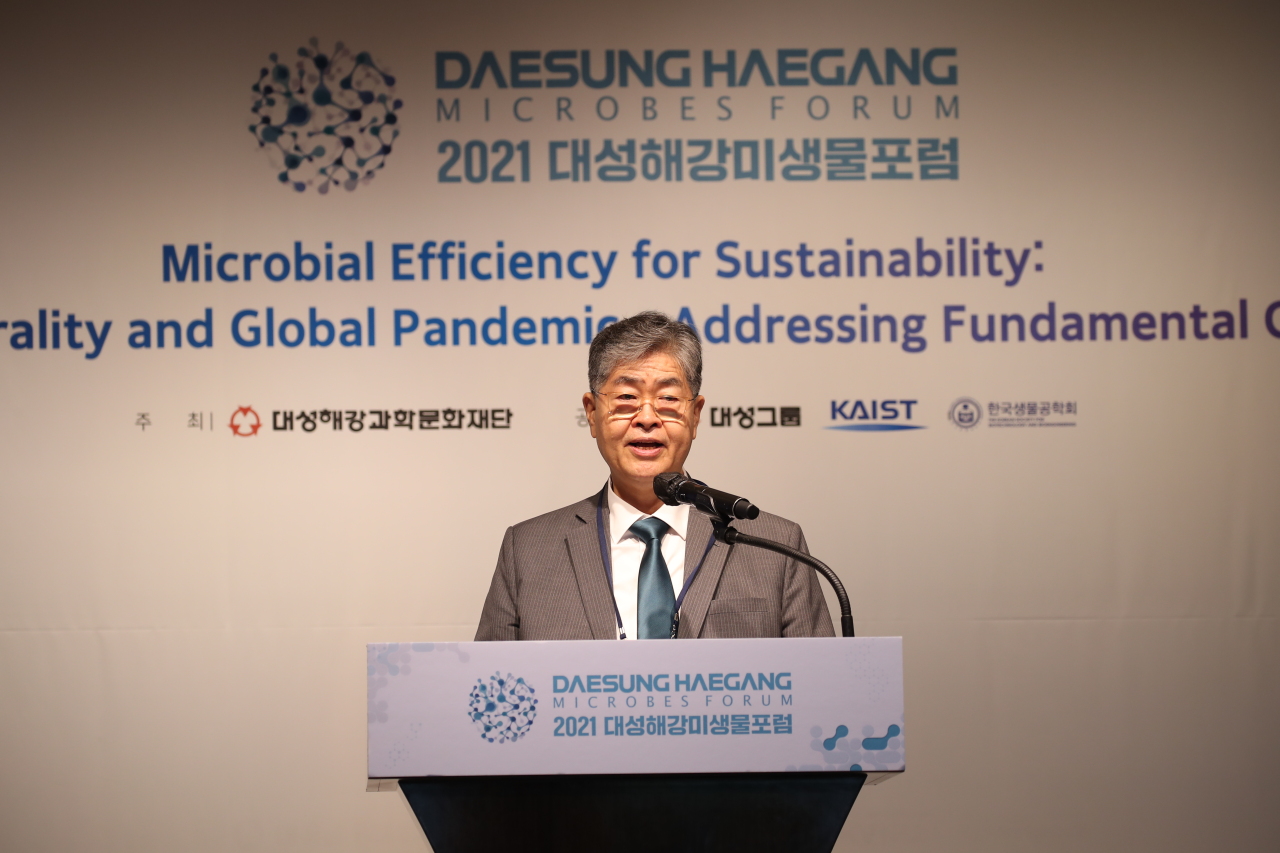Daesung chief pins hope on microbes to turn waste into biodegradable plastic
By Kim Byung-wookPublished : Sept. 28, 2021 - 15:24

Daesung Group Chairman Younghoon David Kim on Tuesday presented his vision for a waste-free world by harnessing the power of living microorganisms.
Speaking to The Korea Herald at the 2021 Daesung Haegang Microbes Forum in Seoul, he said his energy conglomerate is investing to transform methane emitted from garbage buried inside landfills into useful resources such as biodegradable plastic.
“Until now, we have utilized resources made of dead microorganisms, such as oil. It’s time to utilize living microorganisms to transform waste into useful resources,” said the chairman of the midtier Korean energy group.
The annual sustainability forum -- in its fourth edition -- was held at the Westin Josun Seoul, where microbiology experts gathered to share their knowledge and expertise to tackle with microorganisms the nation’s mounting waste crisis amid the pandemic.
According to Kim, when waste is buried at landfills, methane is emitted through pipes after two to three years. In Daegu, Daesung has been collecting methane from landfills since 2007, turning the gas into the equivalent of 150,000 barrels of crude oil a year.
“With microorganisms, the waste can break down better and at the same time generate more methane gas.”
Kim further stressed the commercial potential of microorganisms, which was explained in the session given by Lee Eun-yeol, a professor of chemical engineering at Kyung Hee University.
During his lecture, Lee highlighted a microorganism technology that can transform methane collected at landfills and farms into biodegradable plastic, livestock feed and methanol, among other products.
“Breaking down plastic with microorganisms, for instance, is 90 percent cheaper than collecting and incinerating it. By utilizing microorganisms, we can create a circular ecosystem of methane,” Lee said, mentioning plastic recycling as one of the technology’s applications.
The Daesung chief also added that his company is maintaining close ties with the research team at the University of Massachusetts Amherst, which is studying a microorganism that can generate electricity by breaking down waste.
“Imagine every household generating electricity by feeding waste into the microorganism inside an aquarium. Microbial engineering fused with various disciplines will be the key to solving climate change and environmental problems, as well as treating incurable diseases,” the chairman said.
Other major speakers included professor Lars Angenent of Tubingen University, a scientist with an expertise in gas fermentation technology for biomaterials and protein production, and professor Matthew Wook Chang of Singapore National University, who has patented a process for creating biodegradable plastic using greenhouse gas.
To further explore the potential of the bio sector, a separate session was held under the topic of “white bio,” which refers to replacing materials from the chemicals industry with renewables such as plants, microorganisms and enzymes.
During the session, professor Lee Dae-hee, a senior researcher at the Korea Biotechnology Research Institute, presented on synthetic biology for microbial metabolism, while Yeom Soo-jin, a biotechnology professor at Chonnam National University, presented her recent discoveries and developments of a new biocatalyst for breaking down plastics.
The Daesung Haegang Microbes Forum was initiated by Chairman Kim in 2017 to underscore the possibilities and importance of microbial engineering, where professor Lee Sang-yeop of the Korea Advanced Institute of Science and Technology introduced measures on producing various natural compounds using microbial engineering with sufficient productivity.


![[Exclusive] Korean military set to ban iPhones over 'security' concerns](http://res.heraldm.com/phpwas/restmb_idxmake.php?idx=644&simg=/content/image/2024/04/23/20240423050599_0.jpg&u=20240423183955)

![[Graphic News] 77% of young Koreans still financially dependent](http://res.heraldm.com/phpwas/restmb_idxmake.php?idx=644&simg=/content/image/2024/04/22/20240422050762_0.gif&u=)



![[Pressure points] Leggings in public: Fashion statement or social faux pas?](http://res.heraldm.com/phpwas/restmb_idxmake.php?idx=644&simg=/content/image/2024/04/23/20240423050669_0.jpg&u=)









